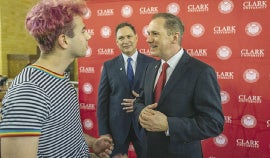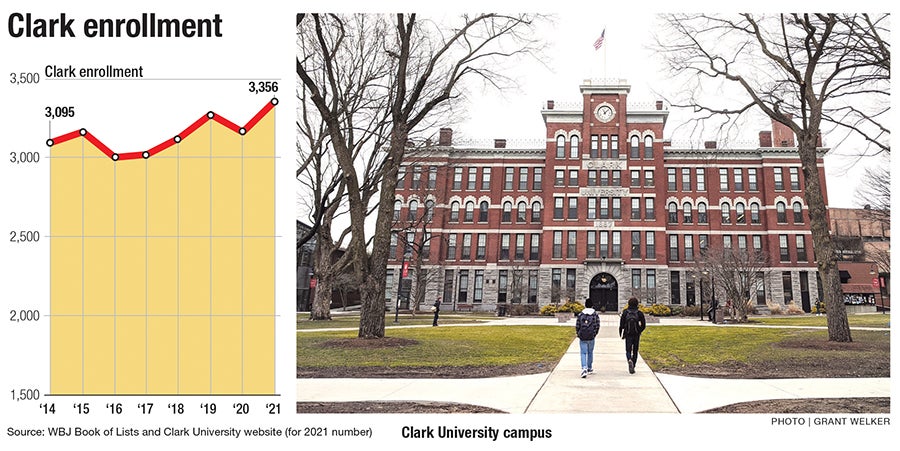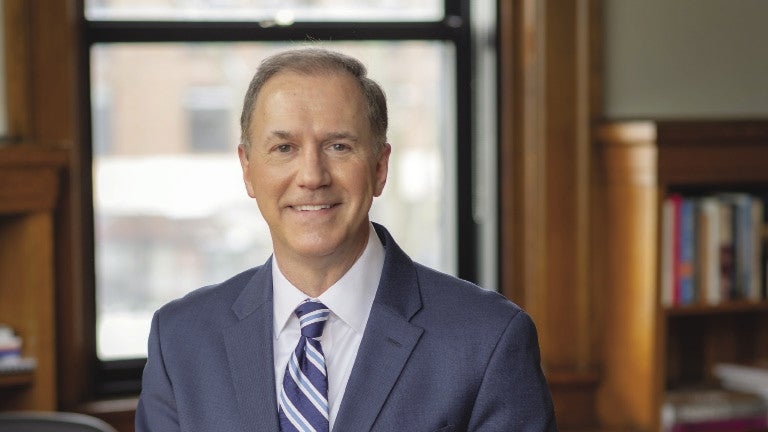President David Fithian’s strategy for Clark University is crystal-clear: The Worcester school is moving into an era of bigger, broader, and bolder thinking.
Get Instant Access to This Article
Subscribe to Worcester Business Journal and get immediate access to all of our subscriber-only content and much more.
- Critical Central Massachusetts business news updated daily.
- Immediate access to all subscriber-only content on our website.
- Bi-weekly print or digital editions of our award-winning publication.
- Special bonus issues like the WBJ Book of Lists.
- Exclusive ticket prize draws for our in-person events.
Click here to purchase a paywall bypass link for this article.
President David Fithian’s strategy for Clark University is crystal-clear: The Worcester school is moving into an era of bigger, broader, and bolder thinking.
At a time when other colleges were buckling down, Fithian was stepping forward, solidifying his vision with action. In the two years of the coronavirus pandemic, he spearheaded efforts to absorb Becker College’s highly ranked video game design program, purchase a seven-acre parcel of land next to campus, and procure $100 million in capital financing – all before he was officially inaugurated.

In contrast with past presidents and in contradiction of at least one long-time community partner, Fithian sees Clark evolving into a household name not just in Greater Worcester but in Chicago, London, and Beijing.
“There had been, when I arrived, a real sense that we’re a humble place and the people who need to know about us know about us,” said Fithian, who was appointed in January 2020 but officially inaugurated two years later on April 30. “I’m all about humility, but I also think it's important to be able to tell your story. And that's what we need to do: we need to tell the Clark story more deeply and to a broader audience.”
New kid on the block
As Fithian looks to draw a larger audience to Clark, the university’s presence in its local community may be in for a change.
Since the 1990s, Clark has had a significant role in the surrounding Main South neighborhood through the University Park Partnership, a revitalization effort meant to benefit both residents and students. This partnership has been facilitated by the Main South Community Development Corp., which focuses on economic development, education, housing, and recreational initiatives.
According to the MSCDC’s executive director, Steve Teasdale, Clark’s 30-year strategy in Main South is shifting under Fithian’s leadership.
“We’re presently in a very tenuous relationship with Clark,” said Teasdale. “I would argue that [Fithian’s] approach is completely different from what prior administrations at Clark University have adopted. It’s one that is really fracturing the working relationship of the CDC with Clark.”
Teasdale said his meetings with Fithian have raised concerns at the CDC and among local business owners about Clark’s future expansion. In what Teasdale described as a blunt discussion, Fithian shared plans to broaden Clark’s footprint into commercial areas along Main Street to create more student-oriented storefronts.
“I understand that universities have to update and stay attractive to student bodies in order to remain competitive with the facilities that they offer. However, I think that really has to be balanced in terms of respecting the interests of the people who are affected by those development decisions,” he said, mentioning concerns he’s heard from local merchants about rents rising if Clark redevelops properties along Main Street.
The CDC leases a building from Clark at 875 Main St., which Teasedale said may not be renewed because it lacks an activated storefront. In response, Clark Media Relations Manager Angela Bazydlo said the 25-year lease runs until 2026 and renewal discussions have not yet begun.
So far, Clark hasn’t made any development plans for Main Street public, but has made moves on the other side of campus, purchasing a $7-million parcel of land on Park Avenue this fall, which expands Clark’s footprint by 15%. The decision to buy the land was a no-brainer, Fithian said, as his strategy will inevitably call for campus expansion, and the vacant plot offers an opportunity to do so with low impact on the neighborhood.
“Here was a vacant piece of land contributing virtually nothing to the community,” Fithian recalled. “We would never get the opportunity again to acquire that much contiguous, unencumbered land sitting there, waiting for an opportunity that close to campus.”
Plans for the Park Avenue land are not yet set in stone, but the university is considering constructing an athletic center with a storefront aspect along the street, Fithian said.
“The city matters for our success, and the success of the city depends on colleges and universities attracting students from around the country and around the world,” he said.

Changing with the times
Fithian’s strategy is set against a background of unique challenges in higher education, which have snowballed during the pandemic.
Roughly 70% of high school seniors in the U.S. believe higher education is not worth the cost, according to a January 2021 study from Washington, D.C. think tank Third Way.
“College and university leaders have a whole range of issues that they haven’t had to deal with in the past,” said Lynn Pasquerella, president of the American Association of Colleges and Universities. “We’re seeing increasing skepticism with respect to the dollar value of a college degree with [students] more interested in short-term career preparation.”
Fithian’s plan of attack is to integrate skilled-based and career-oriented learning into the liberal arts education. This began with the absorption of the game design, esports, and graphic design programs at Becker College when the Worcester school closed in March 2021.
"We talk a lot about the value and importance of interdisciplinarity,” said Fithian. “The disruption that we've seen to the economy and to the job market should convince college-eligible or college-bound students that a broad skill set is incredibly important.”
Clark broke ground this spring on a new Center for Media Arts, Computing, and Design, bringing its visual arts, computer science, and game design departments together under one roof. The center’s construction is funded by $100 million in capital financing, which Fithian procured in November, on top of refinancing Clark’s $56 million in existing debt.
“Anything that colleges can do … to create clear pathways in employment is not a diminishing of the liberal arts curriculum, but essential to it,” Pasquerella said.
Along with connecting STEM and the humanities at Clark, the Becker game design program was ranked second in the nation by The Princeton Review publication, promising to attract students from a broader pool.
“I see Clark not only continuing to play a kind of leading role in offering a high quality education to students in the Northeast, but increasingly becoming more of a national university,” Fithian said.
Fithian’s transformative work at Clark has just begun. The newly acquired capital financing will go toward both campus expansion and renovations of existing Clark buildings, but Fithian said the $100 million is a precursor to a larger campaign, signaling to philanthropists that Clark is getting serious about investing in its future.

